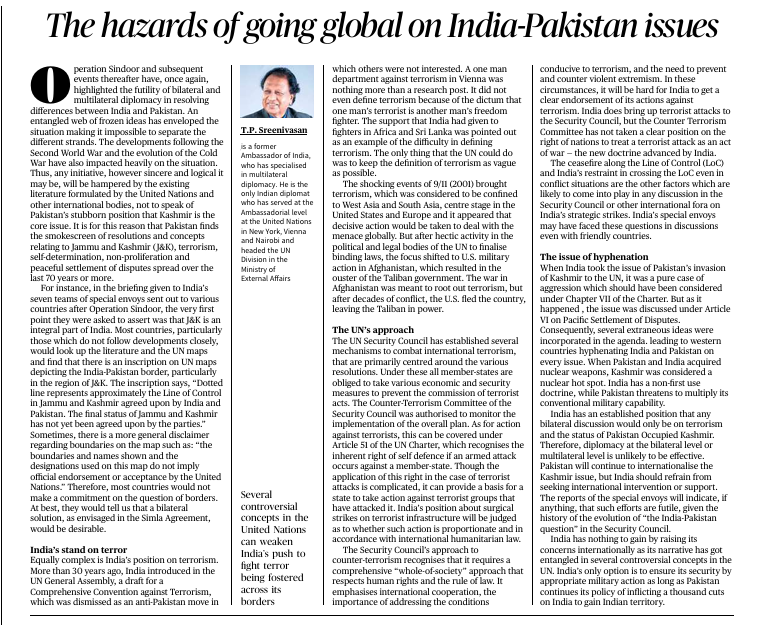I. Context and Background
- Recent developments, especially Operation Sindoor, once again highlighted how bilateral and multilateral diplomacy intersect and often contradict each other in the context of India-Pakistan issues.
- The long-standing issue of Jammu and Kashmir (J&K) continues to be a contentious point, complicated further when taken to international forums such as the United Nations.
- The editorial cautions against the hazards of internationalizing bilateral issues, especially when frozen global frameworks are used to interpret dynamic, evolving realities on the ground.
II. Key Issues Discussed
1. Frozen UN Framework and its Limitations
- The UN literature on J&K, terrorism, non-proliferation, and peaceful settlement of disputes is outdated and reflects the geopolitical outlook of the Cold War era.
- Pakistan takes advantage of this outdated structure, for example, by pointing to UN maps that show J&K as a disputed region.
- Many countries unfamiliar with ground realities rely on such outdated narratives.
Implication: These international documents undermine India’s position that J&K is an integral part of India and that the issue is purely bilateral.
2. The UN’s Inconsistent Approach to Terrorism
- Post-9/11, global counter-terrorism mechanisms were set up but lacked a consistent definition of terrorism.
- The Counter Terrorism Committee (CTC) and Security Council Resolutions aimed to tackle terrorism, but member states used them selectively to suit their national interests.
- The UN failed to acknowledge that freedom fighters in one country can be terrorists in another, which created diplomatic ambiguity.
Implication: India’s attempts to highlight cross-border terrorism from Pakistan often get diluted due to lack of universal definitions and inconsistent political will.
3. India’s Dilemma in Internationalizing Conflict
- India has a clear position that bilateralism is the best approach, as formalized through the Shimla Agreement and the Lahore Declaration.
- However, internationalizing issues sometimes becomes inevitable, especially in cases involving:
- Ceasefire violations along the LoC
- Terrorist attacks with international implications
- Ceasefire violations along the LoC
Implication: International forums are often ineffective and politicized, and do not always align with India’s interests. Even allies may hesitate to support India openly in multilateral settings due to broader geopolitical calculations.
4. The Issue of Hyphenation
- The editorial discusses how India is frequently “hyphenated” with Pakistan in international discourse, particularly on:
- Nuclear weapons
- Human rights
- Religious freedom
- Nuclear weapons
- The discussion on Kashmir in the UN after Operation Sindoor was portrayed by some countries as a case of Indian aggression, although it lacked basis under Article VI of the UN Charter.
Implication: This forced hyphenation dilutes India’s sovereign position and presents false equivalence between an aggressor (Pakistan) and a victim of cross-border terrorism (India).
III. Author’s Argument and Perspective
- P. Sreenivasan, with his deep experience in multilateral diplomacy, argues that taking India-Pakistan issues to international forums can be counterproductive.
- He notes that India’s measured and restrained diplomacy often does not resonate as strongly in international platforms compared to the aggressive posturing of Pakistan.
- He also points out that extraneous issues such as human rights and nuclear proliferation are often brought in by Western nations, distracting from the core issue of terrorism and territorial integrity.
IV. Strategic Implications for India
- Need for Nuanced Multilateralism:
- India must continue engaging globally but should be strategic in choosing platforms where its narrative can be clearly communicated.
- Avoid Internationalization of Bilateral Disputes:
- Bilateral mechanisms remain the most effective way to resolve India-Pakistan tensions, as multilateral platforms carry the risk of political dilution.
- Build Global Consensus on Terrorism:
- Push for a clear, universally accepted definition of terrorism that includes state-sponsored actors.
- Narrative Building and Strategic Communication:
- India needs to improve its global communication strategy to counter misinformation and build support from neutral countries unfamiliar with South Asian dynamics.
V. Conclusion
The editorial emphasizes that multilateral engagement should not come at the cost of national interest. India must be cautious while navigating global platforms, particularly when dealing with strategically sensitive and politically manipulated issues like Kashmir and cross-border terrorism. The case of Operation Sindoor and its aftermath demonstrates the hazards of letting international actors frame bilateral disputes, which often results in ambiguity and loss of narrative control.
10-Marker (150 words)
Q1.
Discuss the risks and limitations of internationalizing bilateral issues between India and Pakistan in the context of United Nations interventions.


